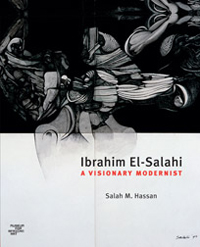Salah Hassan's latest book focuses on Sudanese artist
By Linda B. Glaser

Ibrahim El-Salahi, one of the most influential figures in African and Arab modern art, will be on campus Nov. 28 to discuss his career. His talk, "The Artist in His Own Words," is at 4:30 pm at the Africana Studies and Research Center.
Africana and history of art professor Salah Hassan, who curated a traveling retrospective of El-Salahi's work titled "Ibrahim El Salahi: A Visionary Modernist," arranged the visit. El-Salahi's retrospective, which is organized by the Museum for African Art in New York City, was inaugurated at the Sharjah Museum of Art in the United Arab Emirates and is on display at the Katara Art Gallery in Doha, Qatar. The exhibition will travel to the Tate Modern in London in July 2013.
Hassan also edited a companion book to the exhibit with the same title as the retrospective. A reception for the book will follow El-Salahi's talk.
The book chronicles the evolution of El-Salahi's artwork over more than 50 years. The essays "represent an attempt to reconstruct the remarkable journey of El-Salahi and provide a critical look at his artistic contributions in an effort to expand the narrative of modernism in the visual arts from comparative and global perspectives," Hassan explains.
According to Hassan, El-Salahi's art offers profound possibilities for understanding African and Arab modernisms and repositioning them within the context of a broader, global modernity. El-Salahi's artwork, writing and art criticism have made foundational contributions to the modernist movements in Africa and the Arab world, says Hassan. In his paintings, drawings and illustrations, he engages with an array of traditional African, Arab and Islamic visual sources as well as European art movements. His unique style transcends geographic and cultural boundaries and has inspired artists in Sudan and elsewhere in Africa for generations, Hassan adds.
The book traces El-Salahi's journey from Sudan to the artist's international schooling, his detention as a political prisoner in his home country, his self-imposed exile in Qatar and his current life in the United Kingdom.
Many well-known art historians and art critics contributed essays, including Chika Okeke-Agulu, Sarah Adams, Hassan Musa, Uli Beier, Cornell history of art professor Iftikhar Dadi, Hassan and El- Salahi himself. Hassan's essay contextualizes El Salahi's work in the context of the modern art movements in Sudan, the African continent and the world at large, positioning him as a transnational modernist whose works transcend national boundaries. Dadi's essay situates El-Salahi as part of a wider modernist development after 1945 in Middle East, South Asia and North Africa that investigated Arabic calligraphic forms in relation to painterly modernism. El-Salahi's transformation of calligraphy "demanded breaking open the Arabic letter and exploring the new aesthetic universe that emerged from the fragments and the interstices," Dadi writes.
El-Salahi's campus visit is co-sponsored by the Africana Studies and Research Center and the Institute for Comparative Modernities.
Linda B. Glaser is staff writer for the College of Arts and Sciences.
Media Contact
Get Cornell news delivered right to your inbox.
Subscribe